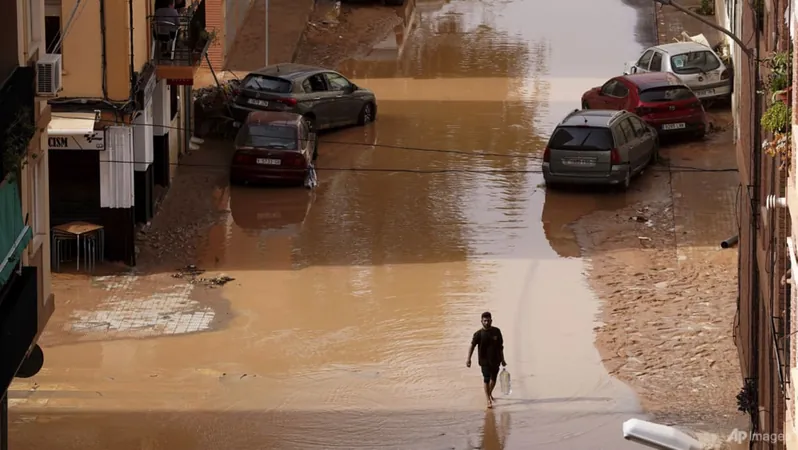
Catastrophic Floods in Valencia Claim 64 Lives – A Wake-Up Call on Climate Change!
2024-10-30
Author: Daniel
In a tragic turn of events, at least 64 lives have been lost following the deadliest flooding to strike Spain in three decades. Torrential rain deluged the eastern region of Valencia on October 29, inundating roads and entire towns. Onlookers and authorities alike grappled with the scale of destruction as local officials affirmed the staggering toll on Wednesday.
As evening fell, heroic rescuers navigated the floodwaters in dinghies, desperately searching for stranded individuals. Footage from the town of Utiel showed rescue workers performing life-saving operations, while emergency services pressed on to reach communities that had become isolated due to the rising waters.
Prime Minister Pedro Sanchez addressed the nation, expressing heartfelt condolences: “For those who are still searching for their loved ones, the entire nation is grieving with you,” he vowed. Sanchez also pledged a commitment to restore damaged infrastructure, stating that the government would work to "rebuild your streets, your squares, your bridges."
Carlos Mazon, Valencia’s regional leader, highlighted the crippling impact on the area. Valencia, known for producing nearly two-thirds of the world’s citrus fruits, faces significant challenges as some residents remain cut off and unreachable. “Access to certain locations is absolutely impossible,” he stated during a press briefing.
The catastrophic storm also affected the central region of Castilla La Mancha, where two additional fatalities were confirmed. As fears of more missing individuals mounted, social media was flooded with harrowing images. Many depicted individuals scaling trees to escape the rushing waters, while some videos showed women being transported to safety in the bucket of a bulldozer.
Transportation infrastructure also suffered; trains to major cities such as Madrid and Barcelona were canceled as necessary precautions. The region's emergency services urged residents to refrain from travel and to heed official directives. Additionally, a specialized military rescue unit was dispatched to assist local responders.
Certain areas of Valencia faced unprecedented rainfall; towns like Turis, Chiva, and Bunol recorded over 400mm of rain—equivalent to a year’s worth of precipitation. In response, the national weather agency AEMET issued a red alert, and while conditions have since improved, storm warnings have spread to northeastern regions, including Barcelona, where high winds and hail were forecasted.
These floods mark the deadliest disaster in Spain related to flooding since 1996 when 87 people perished in the Pyrenees. The most recent events position Spain’s tragedy among Europe’s deadliest flooding incidents since 2021, when devastating floods in Germany claimed 185 lives.
King Felipe of Spain extended his sympathies, commending the emergency services for their tireless efforts. Meanwhile, European Commission President Ursula von der Leyen acknowledged the devastation, stating that Europe stands ready to assist in the aftermath of this disaster.
Agricultural organizations have begun assessing extensive damage to crops, raising alarms about potential impacts on food supply. As the world’s largest exporter of oranges, Spain's agricultural sector, particularly in Valencia, is braced for difficult times ahead.
Climate scientists attribute the shifting weather patterns to climate change, noting that Mediterranean warming significantly heightens evaporation, leading to more intense rainfall events. “These catastrophic occurrences, once rare, are now alarmingly frequent, and their destructive potential is on the rise,” stated Ernesto Rodriguez Camino, a senior meteorologist in Spain.
As the nation mourns and assesses the extensive damage, this harrowing incident serves as a crucial reminder of the urgent need for climate action to counteract these increasingly common and violent weather events.

 Brasil (PT)
Brasil (PT)
 Canada (EN)
Canada (EN)
 Chile (ES)
Chile (ES)
 España (ES)
España (ES)
 France (FR)
France (FR)
 Hong Kong (EN)
Hong Kong (EN)
 Italia (IT)
Italia (IT)
 日本 (JA)
日本 (JA)
 Magyarország (HU)
Magyarország (HU)
 Norge (NO)
Norge (NO)
 Polska (PL)
Polska (PL)
 Schweiz (DE)
Schweiz (DE)
 Singapore (EN)
Singapore (EN)
 Sverige (SV)
Sverige (SV)
 Suomi (FI)
Suomi (FI)
 Türkiye (TR)
Türkiye (TR)